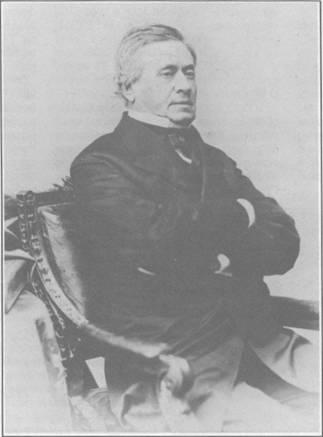
|
||
|
Joseph Henry, the Dreamer
Thomas Edison learned the important principle that there is no use inventing a machine nobody wants. Since then the "doers" have produced an endless flow of technology, and most of it has been useful. We tend to forget the other experimenters who investigated new phenomena for the joy of discovery and then shared it with the world. These were not practical men in search of wealth but "dreamers" who laid the foundation for others to build upon.
The names of Faraday and Henry are kept alive in the obscure electrical terms of resistance and inductance. There is no "Henry Telegraph" or "Faraday Electric" company, yet without these men - an endless string of - "doers"like SamuelMorse would have remained an artist, and Alexander Graham Bell, a teacher of the deaf.
Joseph Henry was born in 1797, in Albany N.Y. He started out studying medicine, but was sidetracked by an interest in mathematics and engineering. Eventually he was to become a professor and lecturer on the subject. He was interested in magnetism, and improveduponEuropean discoveries in electromagnets, eventually producing one that would lift a ton. His wife, though, was not too happy about this. He tore her petticoat into strips, wrapping the cloth around alternate layers of wire to prevent short circuiting.
In the early 1840's, he was demonstrating the magnetic force to his students by connecting a battery to an electromagnetlocated a mile away. This was in turn wired to a coil in the classroom with a clapper attached in a way so that it could move freely. When the magnet was activated it caused the classroom coil to move the clapper and ring a bell. This demonstrated that it was possible to activate a magnet from some distant point. The question as to whether there was a difference between the ringing of a bell or sounding dots and dashes was to become part of a bitter dispute between Morse and Henry.
As it was, the "dreamer" Henry
felt
Unfortunately Henry did not make any money, while Morse received not only the financial reward but also the credit. He never acknowledged Henry's contribution, avoiding any reference to the professor.
Professor Henry was of course hurt by Morse's actions, but it did not stop him from dreaming. He had noted, for example, "thatironbars, whenmagnetized by means of an electric current, become slightly elongated." In keeping with his philosophy, this earth-shattering discovery was added to the general fund of knowledge. This principle was another important stone upon which the foundation of telecommunications was being built.
At 78, he was still a sounding board for would-be inventors. In early March of 1875, a tall black-haired man with a thick Scottish accent presented himself to professor Henry. The 28year-old was uncertain as to what he should do with his discoveries. He showed an apparatus to the old professor and outlined his theory about the transmission of human voice. What should he do? Should he publish his findings and let others work it out, or attempt to solve the problem himself? The young Scot admitted that he did not have the electrical knowledge necessary to further his experiments. Professor Henry looked at him through tired eyes and said simply "get it!"
And get it he did. In a letter to his parents in Ontario dated May 24th, 1875 he wrote that every moment of his time was devoted to the study of electricity. On March 7, 1876, Alexander Graham Bellfiled his famous patent for the "electrical speaking telephone".
So what is success? Is it measured in terms of dollars or in terms of the mark one leaves behind? Henry had great influence on the advancement of electrical science. It was his design that produced the first practical electric motor. It was also Henry who fathered the system of gathering weather reports from across the country using Morse's telegraph. In 1846, Joseph Henry became the first secretary of the Smithsonian Institute. When he died, it was a day of publ is mourning. It was after his death that the unit of measuring self-inductance was named after him.
But sadly, when I called the Smithsonian to ask for a glossy photo of Joseph Henry we might use for this article, the person on the other end asked, "and what did he do?"
|
||
|
||







